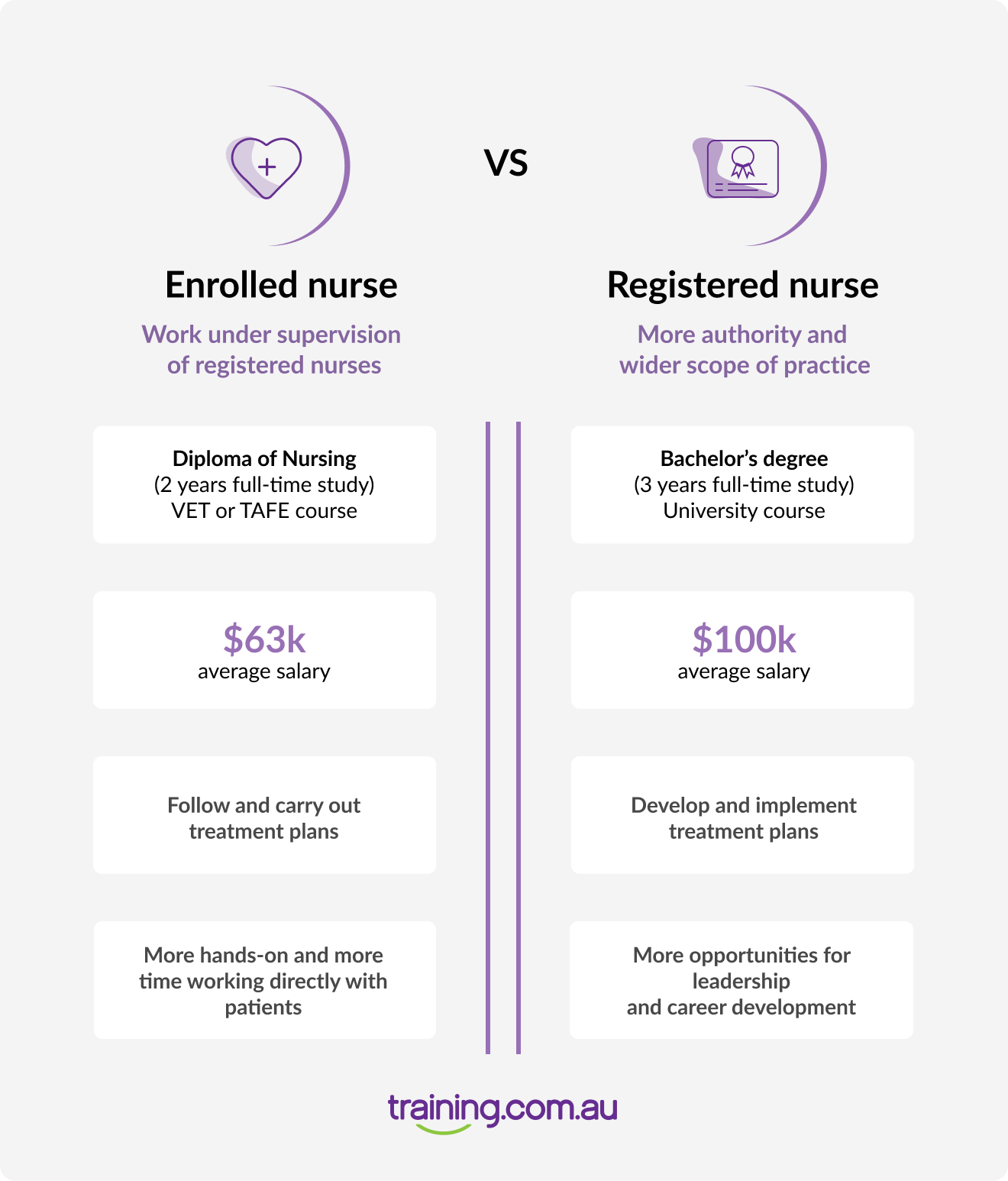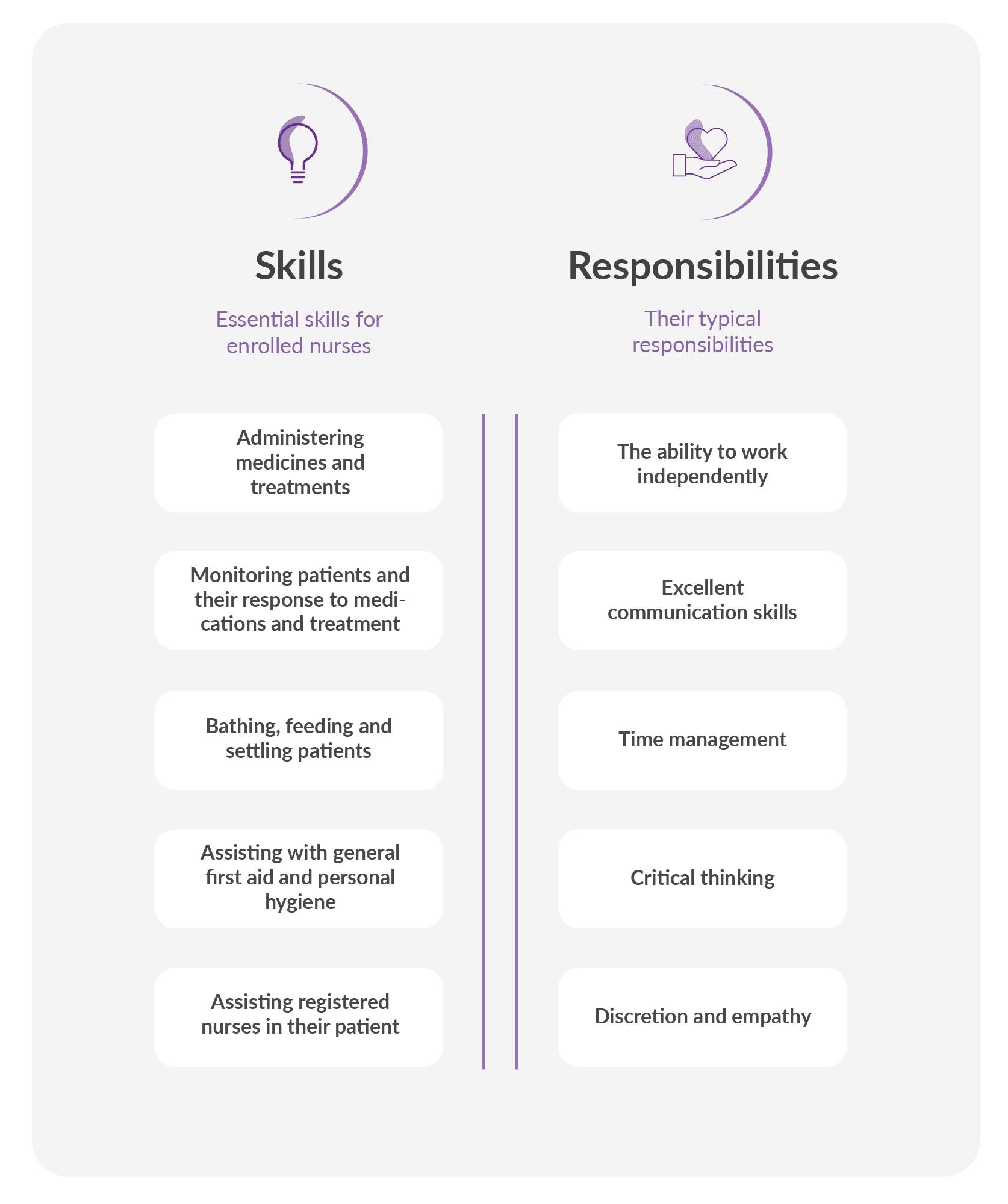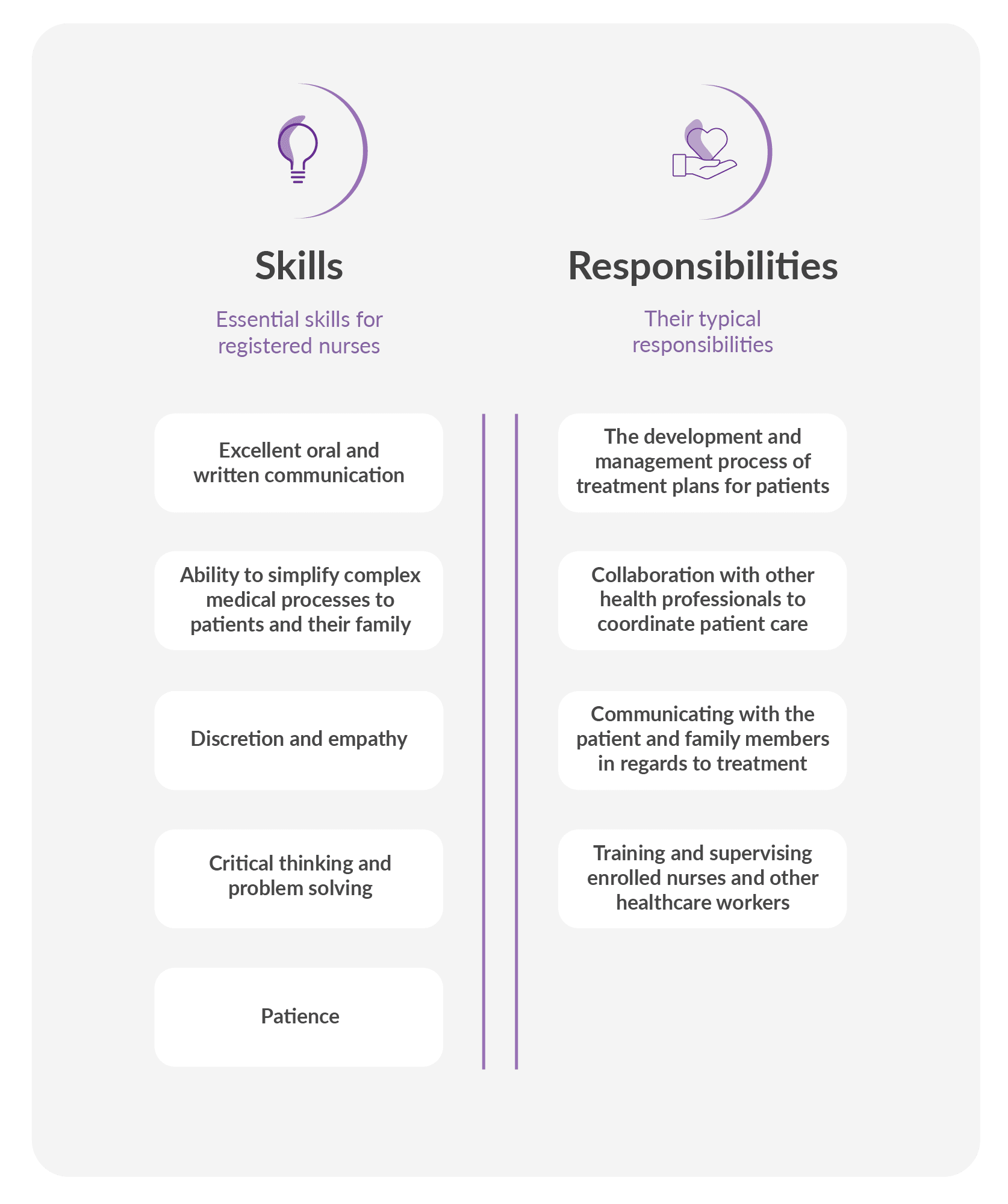In this post
Enrolled Nurse vs. Registered Nurse: Who’s Who?

Nurses are integral to our healthcare industry. This fulfilling and dynamic role can take on several profiles within a nurse’s scope of practice, allowing this career pathway to suit many different types of people.
A nurse’s primary responsibility for supporting and improving the lives of those in need has made this job even more critical in today’s society. Nursing employment opportunities are rising at all levels of entry to support Australia’s ageing population.
The two main types of nurses that you’ll come across in your research are ‘enrolled’ nurses and ‘registered’ nurses. In this article, compare the main differences between these two health professionals, so you can paint a clearer picture of what your career in nursing care might look like.

What is an enrolled nurse?
An enrolled nurse is someone who has, at a minimum, completed a Diploma or Advanced Diploma of Nursing via a registered training organisation (RTO), such as TAFE.
They are a significant part of a medical team responsible for the care and monitoring of patients. However, enrolled nurses are required to work under the supervision of a registered nurse.
Enrolled nurses are second-level nurses, meaning that although they fall under registered nurses, they can experience both direct or indirect supervision. Hence, their competency of patient care and nursing duties are not lacking.

Think of enrolled nurses as the ‘doers’ of the nursing duo. They are the people who administer and apply the correct treatment, medicine and personal care, as outlined by their superiors.
Enrolled nurses can work in:
- Specialist clinics
- Aged care
- General medical practices
- Hospitals (surgery units, psychiatric units, general care)
- Enrolled nurses are in demand all over Australia, with the most employment opportunities in Victoria, New South Wales and Queensland.
Employment hours are also very flexible, with over half of current workers, 57%, working part-time. This allows for more time to be put aside for personal passions and endeavours.
$68,224
average salary for an enrolled nurse
The average salary for an enrolled nurse is $68,224 in Australia. The majority (66.7%) of enrolled nurses have completed either a Diploma or Advanced Diploma of nursing, while a smaller percentage have completed a Certificate III and undergone extensive work experience.
What is a registered nurse?
A registered nurse is someone who has completed their full degree qualification and registered with the Nursing and Midwifery Board of Australia (NMBA). These registrations and the renewal of registrations is managed by Australian Health Practitioner Regulation Agency (AHPRA) After extensive work experience, registered nurses can specialise in specific areas of nursing, such as aged care, or becoming a clinical nurse specialist.
Registered nurses are first-level nurses and often become responsible for a healthcare team of enrolled nurses and nursing assistants.

Due to registered nurses being more involved with the development of care plans, patient-nurse communication is critical.
$100,000
average salary for a full time registered nurse
Much like enrolled nurses, registered nurses can work both full time and part-time, allowing for flexible working hours. The average salary for a full time registered nurse is $100,000.
According to the National Skills Commission, Australian nursing employment opportunities will continue to grow by 13.9% in the next five years. These working opportunities are available all over Australia, particularly in Victoria, NSW and Queensland.
To become a registered nurse, you need to complete a nursing education, including a Bachelor’s Degree in Science (Nursing) or a Bachelor of Nursing. For those who have already completed a relevant Bachelor’s, completing a Master of Nursing (Graduate Entry) is possible.
To legally practice, successful graduates must register with NMBA.
As a registered nurse, you can have an impact in many ways
“I’m proud to be a nurse,” says Jessica Stokes-Parish, a Registered Nurse for over 13 years. Like many, she was drawn to the field through her personal experiences.

“Being a nurse is an opportunity to embrace science and art, exercising a combination of skills that have a profound impact on those around you.”
“The career opportunities are endless – AND diverse,” she says. A statement for which Jessica is living proof — her current work as an intensive care nurse and educator incorporates educational design, quality improvement science and diversity and inclusion advocacy.
Which one is for me?
Both enrolled and registered nursing careers are exciting and fulfilling, with the ability to offer both financial stability and flexibility. However, as you can see, they require varying levels of education and lead to different responsibilities that may suit some more than others.
If you’re leaning towards following the career path of an enrolled nurse, you:
- Only have to complete a Diploma or Advanced Diploma of nursing to get started (2 years full time)
- Get to work within a team under supportive supervision from a more experienced registered nurse
- Will be mostly responsible for the day-to-day patient care responsibilities (showering, feeding, administering medication)
If you’re leaning towards becoming a registered nurse, you will:
- Complete a relevant Bachelor’s degree (3 years full time)
- Lead and support a team of nurses to provide the best patient care
- Become more involved with the development of treatment and care plans at a higher level, rather than just implementing them
- Foster a rapport with your patients and their families to best explain and monitor their care and recovery
Nursing is an incredibly fulfilling and exciting career, no matter which level you choose to enter the health services industry. With the demand for nursing and health professionals growing, as well as many education pathways available to you, it’s the perfect time to start.
Ready to take the next step in your nursing career?
Latest Articles
How to Apply for Work Placement: Tips & Resources
Congratulations! You’re about to embark on an exciting journey where you will practise and develop t...
11 Hobbies That Can Make You Money: Use Your Passion for Profit
Hobbies often get a bad rap. They’re seen as just a way to kill time, a mindless escape from t...
Is The Job You Hate Killing You? Why You Need to Make a Change
Do you hate your job? Studies show that staying in a job you hate has negative health effects and ev...
Want to read more?
How to Become a Plumber: The Best Career Move for You
Thought about becoming a plumber but you're unsure? Read more about the plumbing industry here and k...
Infographic: Highest Paying Science & Technology Jobs in Australia
If you’re considering a job in science and technology, you might be wondering, which science jobs pa...
“Your Interests Are Your Toolkit”: How You Can Succeed as a Youth Worker
Youth work is one of Australia’s most dynamic sectors that can lead to a wide array of roles —...

